This link is part of a test, as is this one. They will be removed once the test is complete.
Jump ahead to:
Background
I’m someone who believes writing well is an important life skill, and learning to write better pays off later. Today, knowing things is not enough. We need to communicate them well. Consider that scientists who communicate well become celebrities.
Writing well help us achieve what we call topical authority, aka being recognized for our expertiese.
I even once required my children to write a page a day when they were on summer vacation from school. Remarkably, one of them even thanked me later.
But, that there are people who help you learn to write better outside of a school environment was missed by me, until one day when I noticed “Writing Coach” in someone’s LinkedIn headline.
How this passed my notice I’ll never know, but once I saw it I became curious about “writing coaches”.
What types of writers do they coach? How do they help them? How did they become a writing coach? Etc.
That curiosity led to this post.
Methodology
I created a survey using a Google Form, and asked a number of people I found on LinkedIn who had “writing coach” somewhere in their profile if they would please take it. Twenty seven people did.
The first question is easy to quantify as I asked the respondents to select from a list, with an “other” option where they could, and did, add options I missed.
Every subsequent answer was free form, which meant I needed to take their long form answers and categorize them. From that, I created the tables below.
We're building a White Hat Link Exchange - for real - click here to learn moreThe compiled data tells a story
Everyone became a writing coach by adding new work (coaching) to existing work (writing and/or editing). It might even be fair to say that everyone became a writing coach somewhat by accident.
Two of the twenty-seven became writing coaches from totally unrelated fields. In their respective jobs, they had to write stuff, and over time writing kind of took over.
How clients find the writing coaches is rather varied, although website, LinkedIn, and referrals dominate, which makes sense.
In terms of how they help their clients become better writers, the top answers are: process, feedback, structure, and “it depends”, which also makes sense, at least to me.
I had a preconceived notice that part of the help provided is to help their clients become better known, and some of this does happen, but less than I expected. It seems the “boundary” around the coaching is to help the client write better, and how the client proceeds from there is on them.
For some reason I expected a common set of success criteria for all clients, but this is not the case. Per their answers, the definition of success here is very subjective.
Thoughts
I have a few main thoughts or conclusions on this topic:
Defining and describing what a writer wants from a writing coach seems very subjective and there is a “figuring it out” that occurs between the two.
But, once that’s figured out, the process of becoming better seems VERY structured and consists mostly of process, structure, and iterative feedback.
I’m reminded of a story that I’ve seen attributed to Ernest Hemmingway and to Jack London, although it’s possible it never happened at all.
The story is that an aspiring writer sought out an established successful writer to ask how to become a better writer.
The biggest advise was to write every day. The established writer said he wrote for six hours a day, every day, starting at 9 am.
To which the aspiring writer asked “Don’t you need to feel inspired to write well?”, to which the established writer answers “Definitely. Which is why I get inspired every day at 9 am”.
Apparently process and structure have always been important for writers.
That writing coaches exist and are making money, tells me that writers are recognizing the need for such help, which to me is encouraging. Apparently I’m not alone in thinking that writing well is an important skill.
We're building a White Hat Link Exchange - for real - click here to learn moreQuestions and answers
Bear in mind that except for the first question, the answers were categorized from their long form answers into the various categories shown below.
What types of writers do you coach?
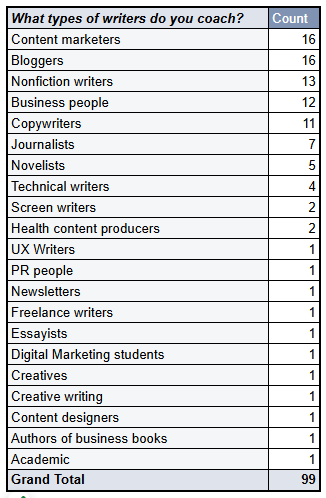
What is your background in writing?

How did you become a writing coach?
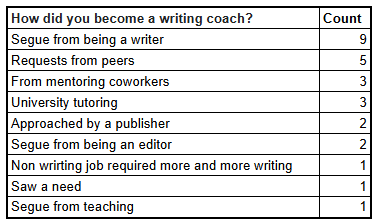
How do clients find you?

How do you help them become better writers?
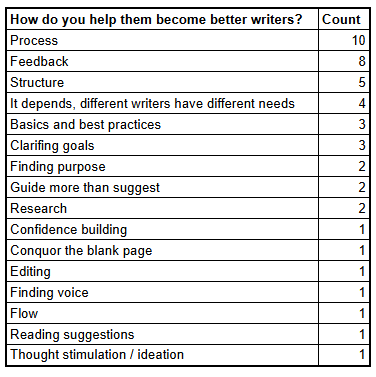
How do you help them become better known?
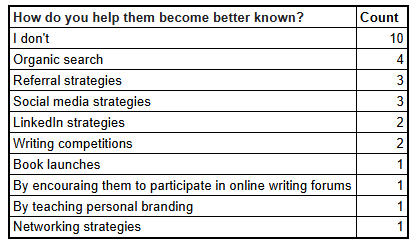
How do you define success for your clients?
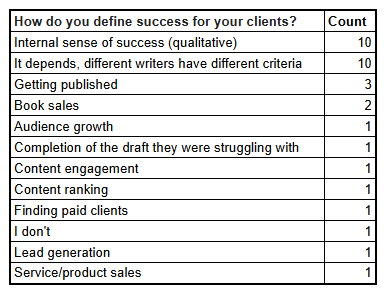
How do you help them achieve this?
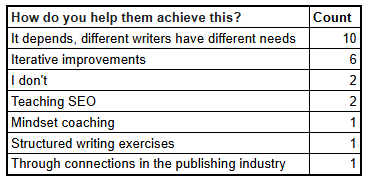
Acknowledgements
I told people if they filled out my survey I would thank them with a mention and a link, and here they are. I appreciate you taking the time to submit my survey. Obviously, without your input, there would be no article.
- Angie House
- Alexandra Sheehan
- Amara Ali
- Alankrita Verma
- Elizabeth Hanes
- Chiara Rossi
- Diana Kelly Levey
- Elisa Doucette
- Elizabeth Fidelis
- Hasan Sabry
- Irveen Kaur
- Jane Heaton
- Jonathan Mast
- Kelly Boyer Sagert
- Lauren Deah
- Laura Gariepy
- Lazim Ali
- Leandre Larouche
- Marie-Anne Chaloupecky
- Marijke Vroomen Durning
- Matthew Connolly
- Reem Abouemera
- Shamila Iyer
- Neda Aria
- Victoria Doxat
